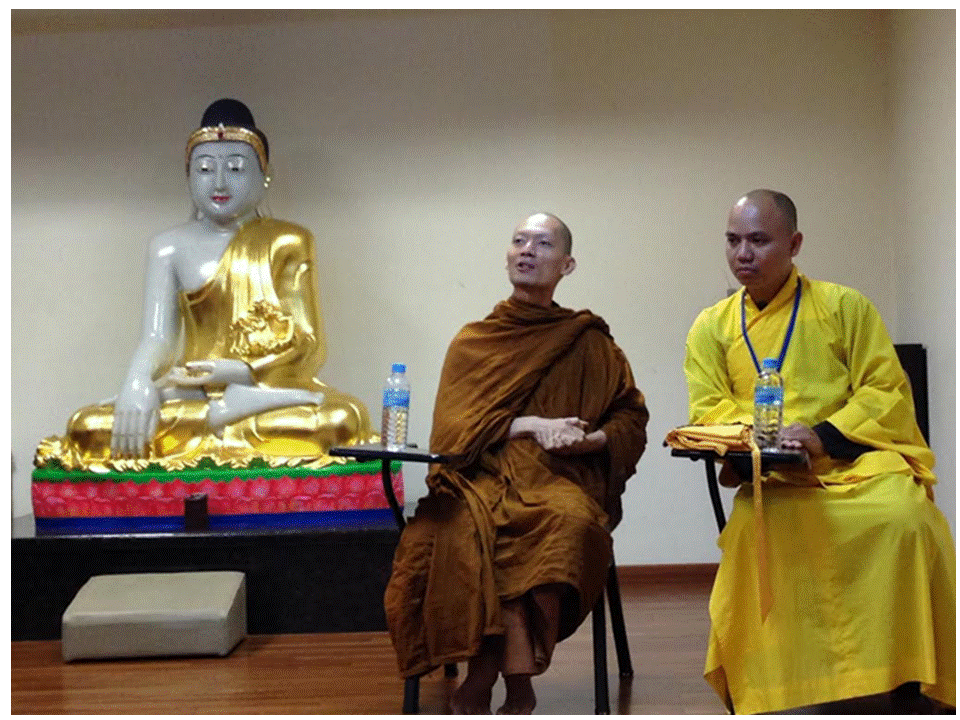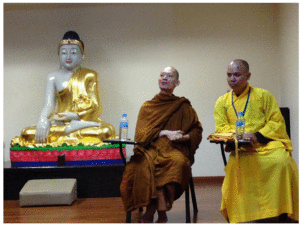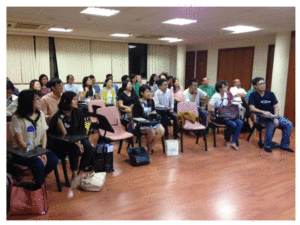In the first Jeta Cove series presented by BuddhistYouth Network (BYN), Venerable Thich An Dat from Vietnam and Phra Chun Kiang from Singapore shared the Buddha’s teachings on Marriage, Love and Relationships.
Held at Vimalakirti Buddhist Centre, Venerable Thich An Dat started the session with a short puja and meditation. Venerable Thich, who has been leading and counseling youths at Buddhist Association of Ho Chih Minh City for more than a decade, gave pointers on how we can strengthen our relationships with our partner.
Venerable Phra Chun Kiang (left) from Wat Palelai, Singapore, and Venerable Thich An Dat from Vietnam.
Choosing Who You Love
Venerable, who holds a Masters in Mass Communication, mentioned when it comes to relationships, there are two types of relationships to bear in mind. The first type of relationships are those that we have the right to choose, such as our friends, lovers and co-workers.
The second type of relationships are those that we do not have the right to choose, such as our parents, siblings and relatives. For the former, Venerable emphasized the importance of choosing one that brings us happiness.
He outlined five guiding questions for couples to ask themselves before committing to a relationship.
- Is your lifestyle quiet or hectic? Lavish or simple? What kind of life would you want to lead and does your partner feel the same way about this lifestyle? Would he or she be supportive of it? Take your time to know the type of lifestyle that suits you. Venerable reminded us about the Buddha’s teachings on leading a simple, contented and happy life.
- Do you have more ‘up’ times or ‘down’ times with your partner? Are you both always arguing? If you have more ‘down’ times, why is that so?
- Does your job suit your personality and capability? Does it affect in performing your roles as a wife, husband, as a son, daughter, father, mother, brother or sister?
- Do you have a Dhamma Teacher (preferably a Sangha member) whom you can trust and turn to for advice? Venerable urged everyone to aspire to have a Dhamma teacher in their lives, if they do not have one.
- Who are the people you mix with the most? Look at your best friends, good friends and acquaintances. How do you support them and how do they support you in your life?
Venerable added that couples to strive to understand each other better, and to always hold equal respect towards each other; not just respecting each other’s mind but respecting each other’s body as well.
Lastly, he related how we can apply the Buddha’s teachings using the Four Immeasurables (Brahma Viharas) as a reference.
- Metta: Offering your love to your partner
- Karuna: Sharing each other’s pain and suffering
- Mudita: Sharing each other’s joy and happiness
- Uppekkha: Not looking down and discriminating your partner
For a more detailed explanation on the above, you can refer to the book “How to love” by Thich Nhat Hanh.
Sigolavada Sutta: The Layman’s Discourse
Phra Chun Kiang, who has given talks and meditation classes at various Buddhist organizations, introduced the Sigalovada Sutta (also known as the Layman’s code of Discpline). During his session, he touched on a few aspects of the Sutta.
The Foundation of One’s Ethics And Morality
In the Sutta, the Buddha mentions four vices to be eradicated. They are: killing, stealing, sexual misconduct, and lying. Phra went on to further explain the meaning behind this teaching, “When we choose not to kill, we practice our compassion. When we choose not to steal, we practice contentment and not give in to greed. When we choose not to have extra marital affairs with others, we respect relationships. When we chose not to lie, we honour the truth.”
Are You Losing Money?
Money is also an important aspect in a relationship. Phra talks about savings and the six ways lay people could lose their wealth. They are: indulgence in alcohol, staying out late, watching theatrical shows, gambling, associating with the unwise and laziness. He also went on to explain how each of these actions lead to six evil consequences.
Q and A
The session continued with a discussion on a range of topics from pre-martial sex, to abortion, to embracing a lover or spouse from another religion.
Participants listening attentively during the Q and A.
On Premarital Sex
Phra commented that there was no specific mention of a certain age limit for one to engage in sex. However, if one is still under the care of their parents or guardians, they are encouraged to refrain from sexual activities as this might led to unplanned pregnancy; and the couple may not be ready emotionally and financially to raise a child.
Venerable Thich advised leaders to educate younger members how they can protect themselves, especially for the girls. This was not only to prevent unwanted pregnancy but abortions as well. Venerable noted the karma inflicted for aborting a baby is very heavy.
In the scenario that the girl becomes pregnant, Venerable added the guy should take responsibility to take care of the girl and the baby; both parties need to bear the karma of their actions.
On Same Sex Relationships
The different Buddhist traditions have different take with regards to same sex relationships. Phra mentions that back in India during the Buddha’s time, there were many different classifications of gender.
The only mention of this in the Suttas was with regards to the Sangha. For example, if one were a homosexual, he or she would not be allowed to ordain due to one’s strong lust and desires towards the same gender. It was also to protect the order of the Sangha community.
There is no explicit mention in the Suttas about lay people loving the person of the same gender. It is believed that it could be due to past karma, that have caused men and women to be born again to like and be attracted to the same gender.
Final Takeaways
Before the session concluded with a dedication of merit, both Venerables shared their takeaways for leaders to bring home.
- Thinking beyond this lifetime
Venerable Thich recounted how Prince Siddhartha and Princess Yasodhara were husband and wife for many lifetimes. Similarly, if we were to seek a partner, we should seek one who also has the potential to be our partner in our next life; someone who will support us in our spiritual path and grow together in the Dhamma.
- Embracing differences in faith
It is perfectly all right to embrace and love another from another religion. One’s foundation of their spiritual path has to be strong; know yourself, your moral values and your religion well.
- Growing in faith together
Real faith comes from experience; from applying the teachings in our day-to-day lives. So put what you know and learn to practice and walk the Noble Eightfold Path with sincerity, faith and effort.
More Than Chocolate and Romance: Post Session Thoughts
During the sharing, my teacher’s advice also came to mind. I remembered his words vividly; if we “could not find someone who was on the same level, or higher as we are – intellectually, mentally, emotionally, and spiritually – then it is better to go solo”. I have stuck to this advice ever since.
But before we can love another, I think the most important person we first have to love is – ourselves. Not in the narcissist sense of self-love, and not the kind of love that only loves the good parts of ourselves, but the kind of love that is all embracing and accepting.
In the words of Venerable Thich Naht Hanh, “To love without knowing how to love wounds the person we love.”
May we all love in a way that the person we love feels free.
May we all be receivers and givers of unconditional love.
* * *
Presented by BuddhistYouth Network, Jeta Cove Series support Buddhist youths and leaders to apply the Dharma in contemporary issues. Stay tuned for updates on the next series.
About the speakers:
Venerable Thich An Dat holds a Masters in Mass Communication and has been leading and counseling youths at Buddhist Association of Ho Chih Minh City for more than 10 years. One of its annual event is a camp participated by more than 1,000 youths from all over Vietnam and other countries.
Venerable Phra Chun Kiang has given talks and meditation classes at various Buddhist Organizations such as the NUS, NTU and Singapore Polytechnic Buddhist Societies, Buddhist Fellowship, Kong Meng San Phor Kark See Monastery, Nibbana Dhamma Rakkha, Palelai Buddhist Temple, Poh Ming Tse Temple and many more. In 2013, Venerable Phra became a member of the IRO Youth to promote harmony and understanding among various faith groups in Singapore.
About the writer:
Michelle (Paduma) Ang is an editor at an online parenting website. She also contributes to the Singapore Buddhist Federation (SBF) quarterly journal Nanyang Buddhist and For You, an independent monthly Buddhist publication. As one of the Vice-Presidents of SBF Youth, she is currently grooming the next generation of leaders. When the mood strikes, she dabbles in poetry, paints and sketches, but is happiest when she is in retreat; surrounded by nature. Her life mission is to sow the seeds of enlightenment, make meditation a daily habit and transcend the idea of worldly love.



Leave a Reply